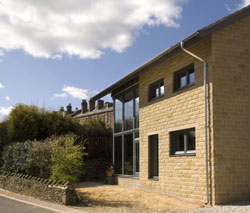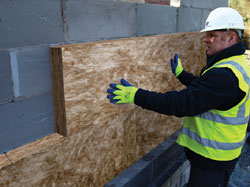Building to PassivHaus Standards with Knauf Insulation
An ambitious project, one of the first certified PassivHaus homes in the UK, has used an array of new build insulation products from Knauf Insulation’s portfolio to achieve outstanding energy efficiency.

The Denby Dale PassivHaus in West Yorkshire has been built to use 90% less energy for space heating than the average UK dwelling – with a space heating need of only 15 kWh/m2/year. The three-bedroom property is the first UK PassivHaus to be built using cavity wall construction and was built to a tight budget of £141,000.
The project was led and managed by Green Building Company, which is the construction division of Passivhaus product specialists Green Building Store. Project Leader Bill Butcher explains: “We wanted to build a PassivHaus using British construction techniques, with, as far as possible, materials you could find in any local builders’ yard. We decided to go down the cavity wall path because of familiarity and arrived at the design for several reasons including: planning restrictions, thermal store, cost, and maybe most important of all, buildability.”
Excellent performing insulation is obviously fundamental to Passivhaus construction and the Denby Dale house has 300mm DriTherm 32 Ultimate cavity slabs in the walls, 500mm Earthwool CarbonZero Loft Roll 44 in the roof void (both of which incorporate ECOSE® Technology) along with 225mm of high-performing Polyfoam Floorboard Standard insulation in the floor. “We're fully filling the cavity with glass mineral wool insulation for the walls above ground, because it is easier to fill the cavity – fitting around the ties and openings – and it's easier to install,” comments Bill Butcher.
Glass mineral wool was specified over rigid insulation to ensure a tight thermal fit. DriTherm Cavity Slabs are flexible enough to eliminate air gaps and prevent heat loss due to their inherent ability to knit together at joints between the slabs. If rigid insulation is used and fitted badly with too many gaps, air movement around and between the insulation boards is increased, which can drastically reduce its insulation value.
DriTherm Cavity Slabs are BBA Certified for all exposure zones and formally guaranteed for 50 years to prevent the transmission of liquid water from the outer masonry leaf to the inner masonry leaf.
In addition to its thermal performance glass mineral wool also has other sustainable features. In manufacture it uses a high content of recycled glass bottles and requires less overall energy consumption than some alternative products, resulting in less carbon emissions. In addition, it can be recycled at the end of a building’s life and has zero GWP and zero ODP. ECOSE® Technology further extends these established green credentials as it is manufactured with 70% less energy than traditional binders and the products contain no dye or added formaldehyde – providing the ideal solution to the eco-friendly house.
PassivHaus Planning package (PHPP) software was used with the early design to ensure that the Green Building Company kept the space heating needs at or below 15kWh/m2/annum – the prerequisite for PassivHaus certification. Modelling different materials in the online PassivHaus Planning Package has dramatic effects on the figure depending on which type of wall insulation and window configurations have been inputted.

“Two and half years ago we decided to build a low energy home for our retirement and it was important to use high performing, and cost-effective materials – as we were on a fairly tight budget . We hope that our house will be a template for other PassivHauses in the UK using methods and materials familiar to the UK construction industry whilst still adhering to PassivHaus performance criteria,” explains Geoff Tunstall, homeowner.
For more information on Knauf Insulation please visit http://www.knaufinsulation.co.uk
Ends
Knauf Insulation
P O Box 10
Stafford Road
St Helens
Merseyside
WA10 3NS
Tel: 01744 766600
